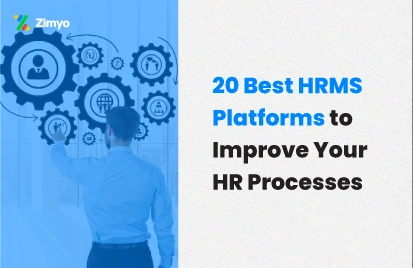The day you’ve been waiting for is here. You’ve landed the job of your dreams – congratulations! But the needful is still pending – your two weeks notice. The activities and attitude you play by in your final days or weeks impact the smoothness of your notice period.
The manner in which an employee leaves a job will stay with them and their professional reputation for years — and as professional communicators, we all are familiar with the importance of professional reputation.
What to do when you’re moving into the notice period for job? What errors should you avoid when sharing your two weeks notice? Keep on reading, and you’ll find the answers to all your queries.
What is notice period?

The notice period is a time frame in the employment contract which begins when the receipt of an employee’s letter of dismissal is received up till their last working day. Employees’ leaving the entity ties up all the loose ends to make the process a bit smoother for the employer and the potential replacement.
Change is inevitable, and the transition of job transfer can strain working relationships if not navigated professionally by both the employer and the employee, so offering this time period becomes a necessity.
Serving the notice period does not entitle you to slack off from your duties as it can sour your relations with the current employer.
The usual notice period time frame is 1-2 months from when an employee submits their papers. The duration, however, can be negotiated at the time of the exit interview in accordance with the company’s policies.
Let’s go through some important tips when serving your notice period for job.
What to do when serving notice period?
The notice period should be served with the same precision shown during the initial days.
A few do’s are mentioned below to ensure you can leave the company on a positive note with your integrity intact.
DO’s
1) Tie all the loose ends
Often people turn away from their current job when serving the notice period. The excitement of a new journey is understandable, but to maintain professionalism, one should always put just as much effort into the concluding days.
A brief on the unfinished projects would be appreciable by employers, and the potential replacement to pick tasks up without much delay.
This portrays traits of integrity that, despite leaving, the employee had the team’s best interest in mind.
2) Be appreciative and civil
Be it through an email or in person, let your employer know how grateful you are to have worked for them. Focus on the positives from thereon out.
Avoid giving criticism and gossiping to others. Just be grateful for the opportunities you received while working in the organization.
Furthermore, maintain a diplomatic stance and provide insightful feedback about the organization at the time of the exit interview.
3) Keep the connections in the loop
Update and inform all the clients, associates, and colleagues beforehand about your last day of work amidst the serving notice period.
Ensure a smooth transition by offering the correct contact details of the next in command or the manager. Relieving employees shouldn’t hinder the workflow, and the clientele shouldn’t face any hurdles till a replacement takes over.
4) Bid farewell with a positive impression
Expressing gratitude towards the prime people of the organization is yet another way of leaving a lasting impact. Send thankful emails, write recommendations on LinkedIn for others, and take the time to bid farewells in person as well. Leave the role while securing the reputation and relationships.
A positive impression assists in retaining relationships for the future. One might return to the old job or can work with or for the same colleagues in different companies.
These are a few things you should be doing while serving notice period, whereas there are a few things you shouldn’t be practicing as well.
More from Zimyo:
How To Conduct Exit Interviews
A few don’ts are mentioned below to ensure you won’t be leaving the job on a negative note.
DONT’s
1) It’s not a vacation… yet.
Some employees might put their feet up when they’re serving the notice period. Kicking back shouldn’t be an option as it’ll only depreciate the professional reputation in the concluding days.
Instead, help out your colleagues and teammates rather than doing some unproductive work or scrolling through social media. It’s an official notice period, after all, and not a vacation in the Bahamas.
2) Don’t burn the boat on your way out
Employees often badmouth their companies while serving notice periods, which shouldn’t be the way to go. It can often get awkward for the existing employees to hear the gripes.
The industry circle is small regarding gossip being spread like a forest fire. A move like this can bring a bad reputation knocking at the door in no time and dampen the chances of a successful future.
The best way out is to forgive and forget and part ways with the entity on a positive note.
3) Announce your notice period on time
It’s an essential move on the employees’ part – to let the employer know in advance. The standard notice period time frame is at least two weeks, everywhere. The news given ahead of time acts as a heads-up for the managers to start looking for a replacement and to transition the workload.
If the responsibilities on their shoulders are heavier, employees should provide the notice even more early. Providing something less than two weeks is a rude wake-up call for the employers, which can create a bad reputation for you as well.
4) Reminder! Write that formal goodbye.
Yes, everyone is aware that a particular employee is leaving but leaving with a proper and formal goodbye is the only official thing to do.
Draft emails and take the opportunity to appreciate the colleagues, teams, and heads for the support and guidance. Reminisce the good times and the learnings you’re taking away.
Hopefully, all these steps will make the notice period a smoother sail. No matter what, always send out the proper farewell messages on the last day of your notice period.
Always leave the door to networking and connecting open.
Professional life goes on for as long as one wants, and having professional connections and friends will have to stay for a long time.
The notice period is imperative to understand by both employees and employers. Managers get to have the time to find a replacement, plan for the future and have proper knowledge of the transfer.
On the flip side, the employees have enough time in their hands to wrap up the essential work and move on or hand over the job correctly.
With these tips at your disposal, you can gear up anytime to give in your notice period letter with confidence and clarity.

Fingers crossed! Excel in all your future endeavors!
Notice Period Template
Information of Applicant
Name
Address
Pin Code
Date
DD/MM/YY
Recipient’s Information
Name
Company
Address
City
Pin code
Salutation
Resected Sir/ Madam
Main Body
Paragraph 1
(Mention the duration of notice period and reason for resigning)
Paragraph 2
(Brief about your experience in firm)
Closing Salutation
Sincerely/ Regards
Applicant’s Name/Signature
Frequently Asked Questions (FAQs)
Generally two weeks is the duration for many positions. However, it varies from position to position.
In India, it is lawful for employees to leave their jobs at any point of time without serving their notice period.
If your contract of employment states more than 2 months notice period you have to serve that period.




